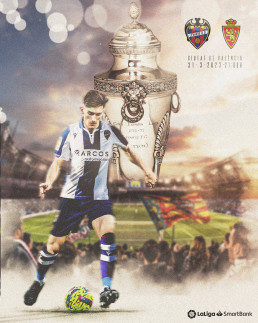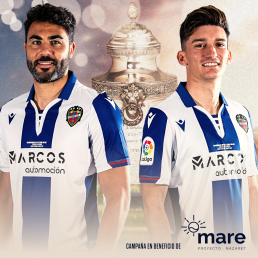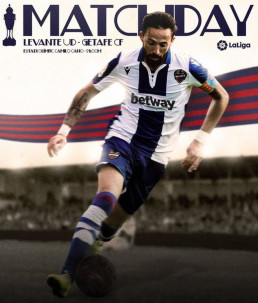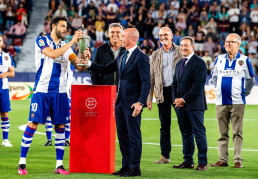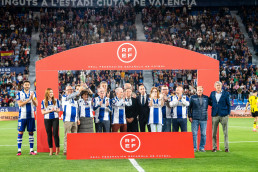On 25 March, Levante U.D. received recognition for the first and, to date, only men’s first team title in its almost 114 years of history. The Spanish Federation, at the express request of Luis Rubiales, finally granted it the legitimacy so often demanded by the club and civil society itself. This was an act of historical reparation for a trophy that, for the winners themselves, as well as their descendants, was fully valid in the face of a categorical refusal that seemed to be eternally established. The trophy, won in the Sarrià stadium on 18 July 1937, seemed condemned to ostracism, dictated especially by the political regime that had been in power since April 1939.
On 25 March, when all the attention seemed to be focused on the match that was to be played at 16:15 at El Sardinero in a clash against Racing Santander, an official communiqué was released by the club’s media, accompanied by an emotional video, in which it was announced that the Copa España Libre had been made official by the Real Federación Española de Fútbol (Royal Spanish Football Federation). The first impressions of Francisco Javier Catalán Vena, president of the club, did not take long to appear. With an emotional face, he went through the different actions carried out with the club that had brought such good fortune to what was to be the club’s first official trophy.
The news, as was to be expected, created great expectation and filled the fans with excitement. Only the situation at the time, in which they were about to play a vitally important match against the Racinguistas, especially taking into account their position in the table, could eclipse a historic afternoon that would remain in the memory of everyone who has Levante U.D. in their hearts. As fate would have it, on the very day on which such a feat had been achieved, the azulgranas played their match away from their fans and their home ground. The feat had taken almost 86 years to be achieved; the acts of vindication had been going on for more than twenty-five years; the Ciutat de València and the Levante supporters could and should have waited until the following matchday to be able to celebrate this feat together.
Matchday 34 was to be played at Orriols against Real Zaragoza. The home side were to witness the home side’s celebration on a date that will live long in the memory of the Granotas. The date was set for Friday 31 March at 21:00. Luis Manuel Rubiales Béjar, president of the Royal Spanish Football Federation, publicly announced that he would be present at the event. The Ciutat was to be decked out for such a special occasion.
Days before the match, the club began to launch different publications that tried to praise what was going to happen that Friday. The Cup, which already belonged to all Levante supporters, was shown on all the posters announcing the match against Zaragocistas.
Iborra and Pepelu had been chosen to represent the club in the different graphics produced by the club. Both symbolised the granota sentiment and embodied the signs of identity of a club that had achieved a historic achievement after hard knocks on the anvil. With both characters came a new piece of news that dazzled all the Granotas fans: the Blue and Whites’ second kit for the 2019/2020 season was going to be brought back. This shirt also had a symbolic character because of two completely different situations: firstly, because it was a commemorative shirt for the Copa España Libre; secondly, it was worn on a single occasion against Getafe C.F. at the Estadio Olímpico Camilo Cano in La Nucía as part of the COVID-19 pandemic. The sponsor and a commemorative legend on the chest were the only identifiable features that had been added in relation to the shirt presented in July 2019.
The event had a strong nostalgic character; those heroes who won the 1937 Cup and who saw football as an escape from the rawness and despair experienced since the outbreak of the civil war in July 1936, perished long ago without being able to see their feat recognised. The recognition was to be celebrated without the architects being present, but their memory was to be immortalised through the legacy they left behind. Relatives and friends of some of the players of that Levante F.C. played the leading role that they deserved at the time, not wanting to miss the opportunity to honour their memory and such brave deeds in the service of the maritime club.
The celebration was also to be a symbolic one, given that it had taken 86 years for the title to be recognised and that the event was to be framed by a football match to be played at 21:00. The time required by La Liga also made it impossible to extend the event very extensively.
The opening chords of La Copa es Nostra (The Cup is Ours) by the Granota singer-songwriter Lliure were the first chords to be heard. The Granotas fans responded to the call of such an important event, attending en masse to the Ciutat de València stadium, which was to experience an unforgettable event in its almost 54 years of life. After the warm-up, the moment arrived. The players from both teams shared greetings in the tunnel as they waited for the countdown, which continued with the Levante anthem and the respective teams taking to the pitch in an almost martial manner.
Behind them, the relatives and friends of the heroes of 1937 were also present and prepared for a well-deserved ovation from those in attendance at the temple of granota sentiment. Ballesteros, Latorre, Barrie and Mut joined in this beautiful company, having had the honour of being captains of Levante U.D. All of them were presented over the loudspeaker, receiving the acclaim of the attendees who cheered the names of their relatives.
Afterwards, Luis Rubiales, Francisco Catalán, Salvador Gomar and Iborra went to the chosen meeting point to hand over the trophy, which had previously been placed on a pedestal by Emilio Nadal.
The celebrated but intense ceremony concluded with Luis Rubiales presenting Vicente Iborra with the Copa España Libre championship. Iborra, wearing the captain’s armband, presented and offered the trophy to a Ciutat de València that exploded with jubilation. The legalisation of the cup had taken on a figurative meaning through a symbolic handing over of a title that Levante already held.
After this, Iborra decided to pass the trophy to Jobanna Calpe, granddaughter of Ernesto Calpe Gil, one of the authors of the victory and an employee of Levante Unión Deportiva. Visibly moved, she handed over the triumph to her father and, subsequently, the legalised trophy was handed over among the attendees, giving way to a joint photograph that would immortalise one of the most important episodes in the club’s history.
